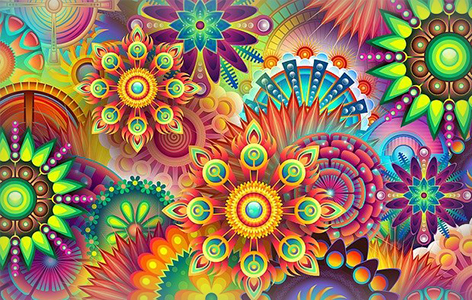
By: Joe Walton, ORT Science Writer
The first anniversary of the global pandemic is approaching and COVID-19 continues to surge. As we navigate a ‘new normal’ of quarantines, lockdowns, and uncertainty, our collective mental health is taking a beating. Even before SARS-CoV-2, the Western world was coming to grips with a crisis in mental health. Depression, anxiety, and addiction are on the rise and mental illness is now the leading cause of disability in Canada. Although the development of effective vaccines has brought hope for an end to the viral pandemic, no such resolution exists for the ‘shadow pandemic’ of mental illness. Yet, in the midst of chaos comes renewed excitement for a set of potentially disruptive therapies. One catch: they are still illegal.
Turn off your mind, relax and float downstream
Humanity’s relationship with psychedelic compounds predates written history. References of divine natural substances like psilocybin mushrooms and mescaline cacti feature heavily in some ancient ritualistic practices. The first synthetic psychedelic, lysergic acid diethylamide (LSD), was synthesized and accidentally ingested in 1943 by Dr. Albert Hoffman, who, unwittingly embarked on the world’s first ‘acid trip’. The mind-bending properties of these drugs piqued scientific interest and launched a flurry of investigation between 1950 and the mid-1960s. During this time, more than 1,000 clinical papers were published, and six international conferences were held for psychedelic drug therapy. There was an earnest belief that these compounds represented a new treatment modality for a range of mental health disorders. Unfortunately, politics of the time quickly stifled this burgeoning field of neuroscience. Recreational use of psychedelics by the counterculture of America created a backlash from establishment forces. In 1970, the US passed the Controlled Substances Act, blacklisting psychedelics and effectively ending all research for the next three decades.
Restriction and a research renaissance
Despite prohibition, psychedelics persisted in an underground world of self-experimentation and anecdotal report. Interestingly, some very influential people, including Steve Jobs and Francis Crick, have attributed their success to the noetic effects of these illicit compounds. Over the years, cultural attitudes have evolved, and restrictions have loosened to once again allow the study of psychedelics. Recently, a number of phase II clinical studies in depression and anxiety have been so encouraging that in 2018, the FDA granted psilocybin a ‘breakthrough therapy’ designation for major depressive disorder.
A new treatment paradigm?
One very compelling feature of psychedelic therapy is the response durability following a single high-dose treatment session. Unlike current mental health drugs, psychedelics appear to stimulate changes in mood that last long after the drug has been metabolized. If these effects continue to be validated in clinical studies, a radical rethinking of treatment paradigms will be necessary.
The tragedy of psychedelic prohibition was the obstruction of science and the potential loss of desperately needed therapies. If the legacy of COVID-19 includes a renewed respect for the power of well-supported science, it would be to our shared detriment should we fail to harness that respect in the face of a continuing mental health crisis.




